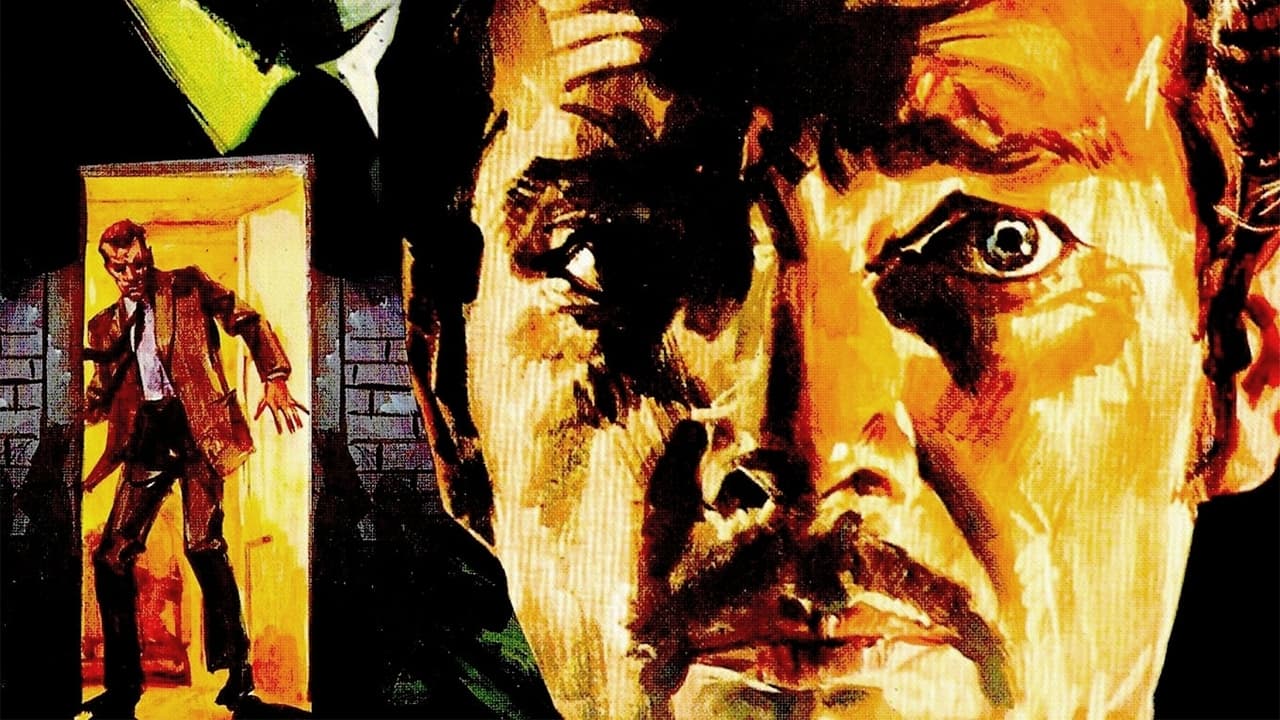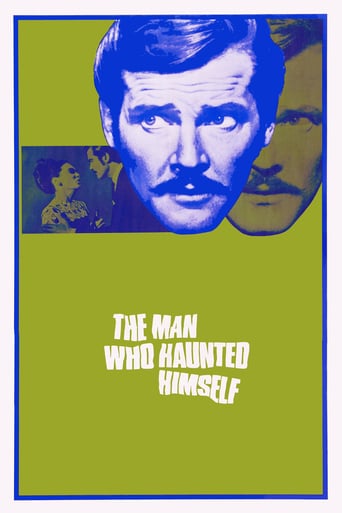Hellen
I like the storyline of this show,it attract me so much
2hotFeature
one of my absolute favorites!
Acensbart
Excellent but underrated film
Juana
what a terribly boring film. I'm sorry but this is absolutely not deserving of best picture and will be forgotten quickly. Entertaining and engaging cinema? No. Nothing performances with flat faces and mistaking silence for subtlety.
Leofwine_draca
This intriguing chiller has an original premise for once - a man is haunted, not by a ghost, but by his own double! This clever idea manages to carry the entire film, which is in itself quite slow-moving but nonetheless gripping thanks to a solid central performance from a pre-Bond Roger Moore. Moore has never been regarded as much of an actor but I think he does admirably well here, conveying the frustration and fear at a life slowly falling apart extremely well.For once this film fully explores the central theme, and never explains whether Moore is ill or is really being haunted until the end of the film. Until then, the tension is gradually wracked up with events becoming stranger and stranger until it seems that there is no escape for the poor, harassed Moore. He starts off as an immaculately dressed businessman and ends up as an unkempt wreck - a transformation with devastating consequences. Moore even provokes sympathy in some pivotal sequences, especially the final confrontation with his doppelganger in which even his family do not recognise him anymore - a heartbreaking moment.Lots of familiar British character actors pop up in minor roles. Thorley Walters is his usual bumbling self, while familiar hammer players Gerald Sim, John Carson, and even Charles Lloyd-Pack flesh out small parts. But it's Freddie Jones and Kevork Malikyan who stand out as a psychiatrist (inevitably loopier than his patients) and Spanish manservant respectively - both giving their hammy best in over-the-top parts.This is a fun, engaging and totally unique film which is a delight to watch and doesn't require any brain work whatsoever. Thus it's an extremely easy and enjoyable film to have on, although I'm not too sure of the repeat potential - once you know what happens, there's not much point sitting through it all again. For the most part, though, this is an unfairly forgotten gem of British cinema, dated, yes, but miles better than you would probably imagine and than reviews would have you think.
jc-osms
An excellent low-budget British thriller with Roger Moore in a double role as a placid London city-gent who lets his suppressed wilder side out behind the wheel of his car only for the inevitable resulting car crash to quite literally split him in two. From them on, the mystery of Moore's doppelgänger deepens, taking in out-of-character visits to a snooker club and casino, murky dealings in the city and a dalliance with a young female photographer, before the nail-biting climax sees him finally catch up with and then attempt to run away from himself only for another car-crash to bring about a final, satisfactory conclusion.Moore is very good, yes believe it, very good as the anguished businessman in two minds (and bodies) about himself, displaying both facets of his character's character (if you follow me) as one struggles to track down and the other to exert supremacy over the other. No Simon Templar or of course James Bond-in-waiting this, indeed, Moore's character suffers from impotence, of all things. Of course the story is highly preposterous and could be viewed as an extended, more adult version of an episode of contemporary ITC productions like "Randall and Hopkirk Deceased" or "Department S" but this sort of stuff is in Moore's DNA and he plays his characters arrow-straight and convinces the viewer that he is perhaps losing his mind.There's good support from the reliable Anton Rogers as his colleague and confidante in the firm, while Hildegard Neil is quietly effective as Moore's dissatisfied and disbelieving wife. Director Basil Deardon, who by a tragic coincidence died only 18 months after making this film also in a terrible car crash, keeps the tension stoked throughout, gradually leading the audience to the unlikely yet inevitable conclusion to the drama. The London settings, seen today over 40 years later, are evocative, although the fashions and in particular the muzaky soundtrack do date it somewhat. There's also an accidentally amusing moment when Moore's character deprecatingly if presciently compares himself to James Bond.Nevertheless, this is a genuinely intriguing and involving mystery thriller with a touch of the supernatural about it to give it that little extra edge.No two ways about it...
Paul Andrews
Could have been good but an indifferent climax spoils it.*** This review may contain spoilers *** The Man Who Haunted Himself is set in London where electronics company executive Harold Pelham (Roger Moore) lives with his wife Eve (Hildegard Neil) & two young children, while driving home one evening Pelham crashes his car after losing control & is seriously injured. Pelham is rushed to hospital where he is operated, during surgery Pelham clinically dies for a couple of minutes but the doctor's manage to revive him. After recovering from the accident & returning from a holiday in Spain Pelham is eager to get back to work but learns that a rival electronics firm is trying to buy his company, strange things start to happen as well with various people saying that they saw Pelham several times the previous week even though he was in Spain on holiday. Pelham at first shrugs it off but soon realises that someone claiming to be him has been interfering in his affairs including having an affair, leaking sensitive company secrets & meddling in his life. Pelham has no explanation as the truth when revealed is beyond belief...This British production was directed by Basil Dearden who ironically died in a car himself about a year after The Man Who Haunted Himself was released & could have been a great supernatural mystery thriller but for the whole ambiguity of it which I personally didn't like, I have nothing against films leaving certain things for the audience to work for themselves but I didn't think The Man Who Haunted Himself made much sense. In particular the start when Pelham crashes his car during what looks like him being possessed even though the climax has Pelham's double claim he was set free during the time he was dead on the operating table, it's never really explained what Pelham's double is or why they can't just live happily together. Why does no-one question why the two Pelham's look identical? Why take one Pelham's word over the other when they both look & sound exactly the same? Don't give me the 'because he's wearing a different tie' rubbish either, the whole plot & the plan of the evil Pelham revolves around the fact that the original Pelham decides to wear a pink tie. Right. It's not all bad news though, until the Pelham double is revealed at the end The Man Who Haunted Himself is a fairly gripping mystery thriller as the original Pelham has to solve the mystery of his double but this set-up is wasted as the climax is a disappointment with no great twist & some surreal touches which are not in keeping with the rest of the film. I just would have liked a clever ending that tied everything together better, that's all. At just under an hour & a half The Man Who Haunted Himself has enough intrigue & mystery to keep you interested although it has a fairly sedate pace. Character's are alright if a little flat, everyone except Pelham is very one-dimensional from his housebound wife to his secretary to his snooker playing friends no-one here is fleshed out to any satisfaction or distinction.Very much a product of it's time The Man Who Haunted Himself has dated badly & screams late 60's early 70's with some shocking fashion choices, hairstyles & interior decorating on display. Although considered a horror film of sorts there's nothing that scary or gory here, there are a few scenes which try to generate tension & suspense but there's no outright explicit horror or scares on show. Based on the television episode Alfred Hitchcock Presents: The Case of Mr. Pelham (1955) this was apparently Roger Moore's favourite role & there's even a line of dialogue in which he talks about James Bond in reference to company espionage several years before he actually landed the part of Bond himself.Filmed here in England mainly in London this has decent production values but isn't particularly memorable. The acting is alright, Moore is good & while the supporting cast are decent as well they make little real impression.The Man Who Haunted Himself is a decent time waster, it's an odd supernatural mystery thriller that can't quite decide what it wants to be & ends up being a bit bland & I can't forgive the unsatisfying climax which I didn't feel was any sort of adequate pay-off for the long winded set-up. Watchable in a silly dated way but nothing special.
Petri Pelkonen
Harold Pelham gets in a freaky car accident, but survives.After that he believes there's a duplicate of himself messing up his life.The Man Who Haunted Himself (1970) is directed by Basil Dearden.This was actually his last movie and he died in a car accident near the spot Pelham is supposed to have crashed his car in the beginning of the film.Roger Moore proves here he really is a great actor.All those James Bond films may not give the biggest challenge as an actor, but here he really has to act.His wife Eve is played brilliantly by Hildegard Neil.Olga Georges-Picot is fantastic as the doppelgänger's lover Julie Anderson.Freddie Jones is terrific as Dr. Harris- Psychiatrist.Also great job by people like Gerald Sim (Morrison) and John Carson (Ashton).This is a really fascinating film.It has been called underrated, and that is very true.There's that psychedelic feeling going there.Like when Pelham is escaping his duplicate and he breaks the mirror and we see many Pelhams laughing there.The music is one element that helps create the atmosphere.And it is really a joy to see two Roger Moores in the same room.

